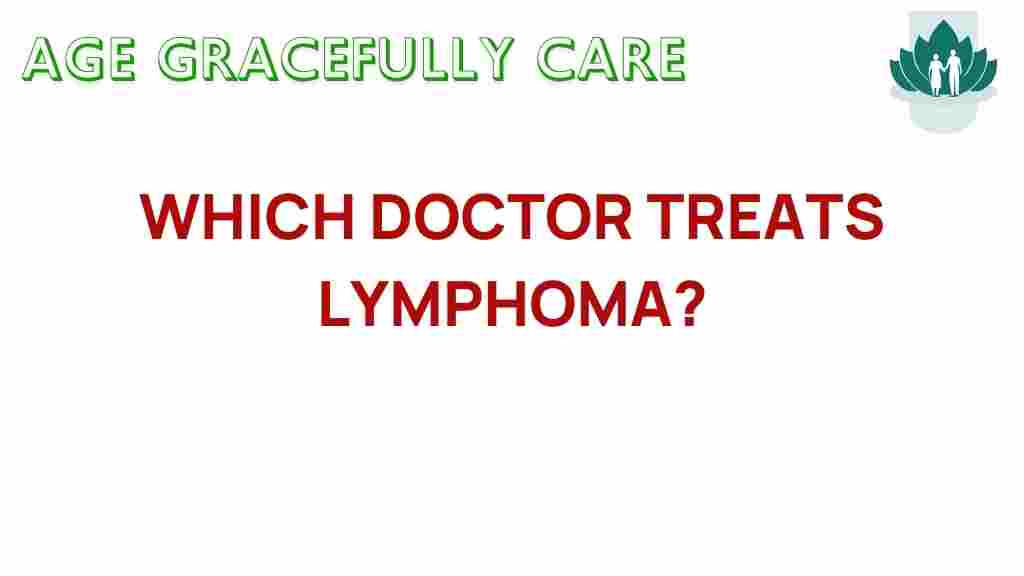Unraveling the Mystery: Which Doctor Is Best for Lymphoma Treatment?
Lymphoma, a type of cancer that originates in the lymphatic system, poses significant challenges for diagnosis and treatment. With various types of lymphoma, including Hodgkin and Non-Hodgkin lymphoma, understanding the best medical professionals to consult can be daunting. This article aims to guide patients through the complexities of lymphoma treatment, focusing on the roles of specialists in oncology and hematology, as well as treatment options available. Let’s delve into this critical topic to ensure effective patient care.
Understanding Lymphoma
Lymphoma is a cancer that affects the lymphatic system, which is a key component of our immune system. The two main types of lymphoma are:
- Hodgkin Lymphoma: Characterized by the presence of Reed-Sternberg cells, this type is often more treatable.
- Non-Hodgkin Lymphoma: A diverse group of blood cancers that includes many different subtypes, some of which can be aggressive.
Each type of lymphoma requires a tailored approach to diagnosis and treatment, making the choice of healthcare providers critical.
Why Specialist Care Matters
When dealing with cancer treatment, particularly lymphoma, it is essential to consult medical professionals who specialize in the relevant fields. The two primary specialties involved in lymphoma treatment are:
- Oncology: This branch of medicine focuses on the diagnosis and treatment of cancer. Oncologists are trained to manage cancer therapies, including chemotherapy, radiation, and immunotherapy.
- Hematology: Hematologists specialize in blood disorders, including blood cancers such as lymphoma. They understand the nuances of blood cell function and can provide targeted treatment options.
Choosing a doctor with expertise in both oncology and hematology can significantly enhance treatment outcomes.
Steps to Finding the Right Specialist for Lymphoma Treatment
Here’s a strategic approach to finding the right medical professionals for lymphoma treatment:
Step 1: Initial Diagnosis
The first step is obtaining an accurate diagnosis. This involves:
- Consultation with a Primary Care Physician: Your journey begins with your family doctor, who can evaluate initial symptoms and refer you to a specialist.
- Diagnostic Tests: Tests such as blood tests, imaging scans (CT, MRI), and biopsies are crucial in confirming lymphoma.
Step 2: Seeking a Specialist
After diagnosis, it’s essential to consult a lymphoma specialist. Here’s how to proceed:
- Research Oncologists and Hematologists: Look for doctors who have experience treating lymphoma specifically. Check their credentials, patient reviews, and success rates.
- Referrals: Ask for referrals from your primary care physician or other healthcare providers.
Step 3: Initial Consultation
During your first visit, consider the following:
- Questions to Ask: Inquire about the types of lymphoma they treat, their treatment philosophy, and the options available.
- Assessing Communication: Ensure you feel comfortable discussing your condition and treatment options with the doctor.
Step 4: Evaluating Treatment Options
Lymphoma treatment can vary widely depending on the type and stage of cancer. Treatment options may include:
- Chemotherapy: The use of drugs to kill cancer cells. Oncologists often tailor chemotherapy regimens based on the lymphoma type.
- Radiation Therapy: High-energy beams used to target and kill cancer cells. This is often used for localized lymphoma.
- Immunotherapy: Treatments that help the immune system recognize and attack cancer cells.
- Stem Cell Transplant: A procedure that replaces diseased bone marrow with healthy cells, particularly in aggressive cases.
Step 5: Ongoing Patient Care
Effective patient care doesn’t end with treatment. Ongoing follow-up is essential to:
- Monitor for Recurrence: Regular check-ups and tests can help detect any return of lymphoma.
- Manage Side Effects: Communicate with your healthcare team about any side effects from treatment and how to manage them.
- Support Services: Consider seeking support groups or counseling to help cope with emotional challenges.
Choosing a Treatment Facility
When selecting a place for lymphoma treatment, consider the following:
- Accreditation: Ensure the treatment facility is accredited by relevant medical boards.
- Multidisciplinary Team: Look for facilities that provide a team of specialists, including oncologists, hematologists, radiologists, and support staff.
- Clinical Trials: Inquire if the facility offers access to clinical trials for cutting-edge treatments.
Troubleshooting Common Concerns
As you navigate lymphoma treatment, you may encounter challenges. Here are some common concerns and how to address them:
Concern 1: Treatment Side Effects
Many patients experience side effects such as nausea, fatigue, and hair loss. Here are some tips:
- Discuss side effects with your doctor; they may adjust treatment to minimize discomfort.
- Utilize medications and therapies designed to alleviate symptoms.
- Stay hydrated and maintain a balanced diet to help your body cope with treatment.
Concern 2: Emotional and Mental Health
Receiving a cancer diagnosis can be overwhelming. Consider the following:
- Seek support from family, friends, and support groups.
- Consult with a mental health professional for coping strategies.
- Engage in stress-reducing activities such as yoga, meditation, or art therapy.
Understanding your insurance coverage can be complicated. To navigate this:
- Contact your insurance provider to clarify coverage for treatments, tests, and specialists.
- Ask your medical facility’s billing department for assistance with financial planning.
- Explore financial assistance programs that may be available for cancer patients.
Conclusion
Choosing the right medical professionals for lymphoma treatment is a critical step in your cancer journey. By understanding the importance of oncology and hematology specialists, following a structured approach to find the right care, and addressing common concerns, you can empower yourself as a patient. Remember, effective treatment options exist, and with the right support, you can navigate the challenges of lymphoma with confidence. For more information on lymphoma resources, consider visiting Cancer.org for comprehensive support.
In your journey towards recovery, prioritize communication with your healthcare team and actively participate in your treatment plan for the best possible outcomes.
This article is in the category Health and created by AgeGracefullyCare Team
